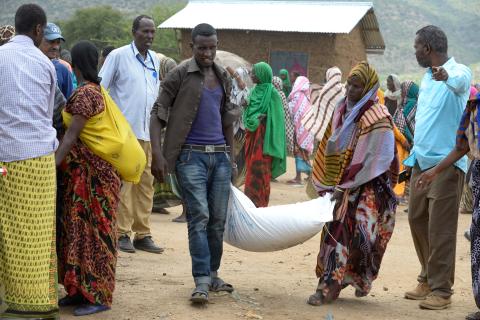The impact of Ethiopia’s Productive Safety Net Programme on the nutritional status of children
Research snapshot1
Ethiopia’s Productive Safety Net Programme (PSNP) is a large-scale, social protection intervention aimed at improving food security and stabilising asset levels. The PSNP contains a mix of public works, employment and unconditional cash and food transfers. It uses a mix of geographic and community-based information to identify chronically food-insecure households in chronically food-insecure woredas; evidence suggests the programme targets well. There were difficulties in making timely and predictable payments to beneficiaries in the first five years of the programme; however since 2010 performance has significantly improved. There is evidence that the PSNP has been successful in improving household food security; however children’s nutritional status in the localities where the PSNP operates remains poor, with 48% of children stunted in 2012. This prompts the question whether the PSNP can improve child nutrition.
This paper examines the impact of the PSNP on children’s nutritional status from 2008 to 2012. The paper draws on four rounds of data from a longitudinal survey of PSNP beneficiaries and non-beneficiaries from 68 randomly selected woredas. Interviews with sample households were undertaken in 2006 (n=3,680), 2008 (n=4,690), 2010 (n=4,654) and 2012 (n=5,092). Information was collected on household demographic composition, assets, agriculture, non-agricultural income-generating activities, consumption, food security, and shocks; anthropometric information was collected in all years apart from 2006.
Based on an analysis using inverse-probability-weighted regression-adjustment estimators, no evidence was found that the PSNP reduced either stunting (height-for-age z-scores) or wasting (weight-for-height z-scores). The reason for this cannot be definitively identified; however the authors note evidence that child diet quality was poor, with no improvement found in child consumption of pulses, oils, fruits, vegetables, dairy products or animal-source proteins during the study period. Most mothers had no contact with health extension workers; nor had they received information on good feeding practices. Water hygiene practices, as captured by the likelihood that mothers boil drinking water, were also found to be poor. Along with work by other researchers, these findings have informed revisions to the PSNP. Future research will assess whether these revisions have led to improvements in the diets and anthropometric status of pre-school children in Ethiopia.
Footnotes
1Berhane G, Hoddinott J and Kumar N. (2017) The impact of Ethiopia’s Productive Safety Net Programme on the nutritional status of children: 2008-2012. Ethiopia Strategy Support Programme (ESSP) Working Paper 99, EDRI and IFPRI.
2Woredas or districts are the third tier of Ethiopian administrative division.


